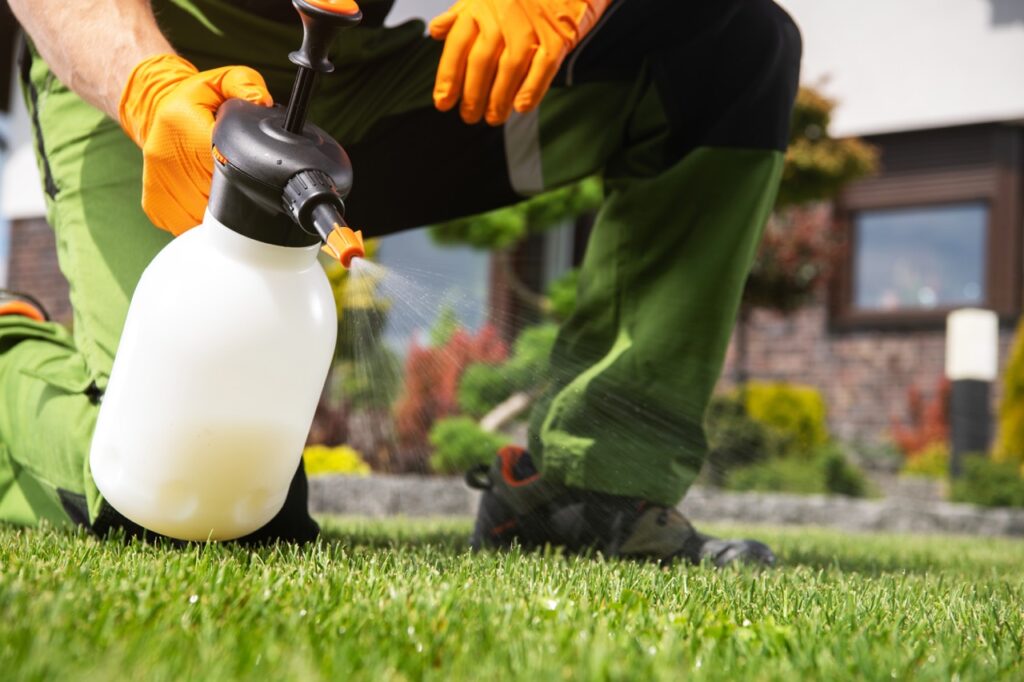Whether you’re new to lawn care or are a seasoned green thumb, it’s important to apply the right products to your grass to encourage growth. Be it fertilizer, weed control, or pest control, what should be sprayed on your lawn?
Weed and Feed
Two of the most important lawn care services Lawngevity offers are weed control and fertilizer applications. Weeding and feeding the lawn should be precisely timed to ensure you’re feeding grass and not weeds with fertilizer.
Your weed control regimen should also include pre-emergent, which can help reduce the growth of unwanted crabgrass on your lawn.
Disease Deterrents
Sometimes even a weed-free yard suffers. Lawns are susceptible to fungus, which can kill off your grass and leave unsightly dead spots. Spraying disease control can prevent or eliminate necrotic ring spots or another fungus like powdery mildew.
How to Tell if Your Lawn Has a Disease
It may be easy to mistake brown patches for underwatered spots in your yard. However, they can be signs of a disease that’s killing your grass. Here are some common lawn diseases and how they present:
Blight
This fungal disease attacks turfgrass such as Kentucky bluegrass, tall fescue, and perennial ryegrass. You’ll see circular patches of dead grass on your lawn that resembles straw. It can present itself quickly, and you can identify blight when single blades of grass are green on the top and bottom, but brown in the middle.
Brown Patch
While this lawn disease also forms circular patches of brown grass, it’s also accompanied by a ring of smokey-colored grass. You may also notice the ground is sunken in the affected area of your lawn. This problem is more common in hot and humid climates.
Dollar Spot
Named for its resemblance to silver dollars in both color and size, this lawn fungus starts small before spreading. It can closely resemble a brown patch, but the circles start smaller.
Leaf Spot
Individual blades of grass are affected by leaf spot. Green grass turns grey when looked at from afar, but up close the blades are red or purple. It’s a common lawn disease in overwatered lawns, or areas where the dew period is long and the evenings are warm.
Mildew
If you notice a white, powdery coating on your lawn, it could be mildew. It grows more abundantly in shady, overwatered spots.
Remedies for Lawn Disease
You can dig up your entire lawn in an attempt to get rid of fungal diseases, but that still may not be enough. If the fungus is living in the soil, it should be treated to eliminate the spread. The right fungicide should be applied to bring the lawn back to good health. Thatching can also inhibit fungal growth, as can watering in the coolest hours of the day and keeping grass no shorter than two inches in height.
Insect Control
If you want to keep pests away from your house, or off some of your prized plants, spraying for insects is imperative. Lawngevity insect control targets grubs, chinch bugs, sod webworms, and even ants. Regularly scheduled application ensures bugs are kept at bay so your lawn and garden can thrive.
How to Tell if Your Yard Has Bugs
Sometimes the types of critters visiting your yard can tell you if you have a pest problem. If you commonly see crows or skunks nosing around your turf, you might have grubs just below the surface. Other signs of lawn pests include:
- Gnawed grass that turns yellow or brown
- Grass blades with holes
- Powdery substance is emitted from the lawn when blades of grass are pulled
- Mounds of dirt in your turf
- White, foamy bubbles on turf
Remedies for Lawn Pests
You can apply natural remedies for eliminating pests, but some are so stubborn that only professionally formulated products will do the trick. Lawngevity pest control is designed to create a preventative barrier to stop insect problems before they start in your yard or home. Lawngevity pesticides are designed to treat the following:
- Ants
- Beetles
- Earwigs
- Mites
- Spiders
- Tics
If you have concerns about other insects, let us know and we’ll see what we can provide as a treatment.
SCHEDULE LAWN CARE WITH LAWNGEVITY TODAY
When you partner with Lawngevity for the nicest lawn on the block, you’ll be informed ahead of time about every lawn spray visit. We also offer free estimates so you know what to expect when it comes to caring for your lawn. Contact us today online HERE, or by calling 801-618-2785.


